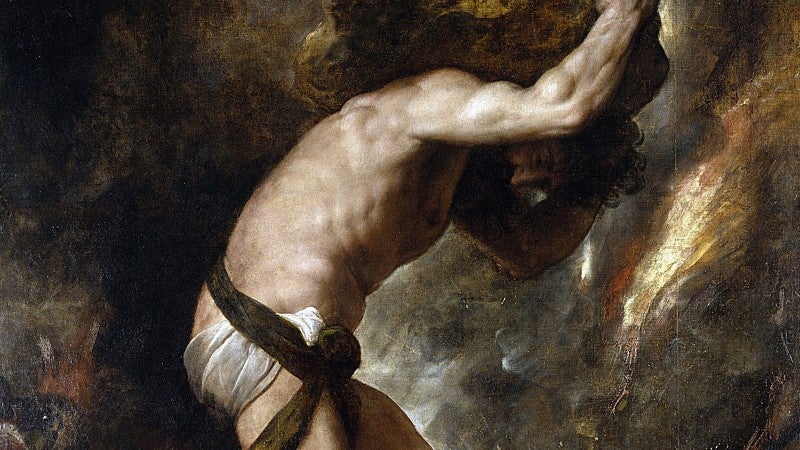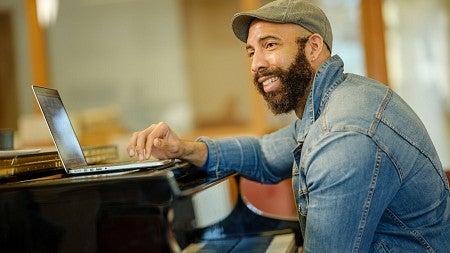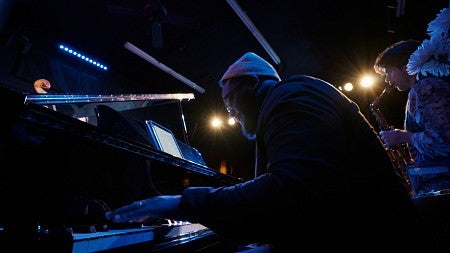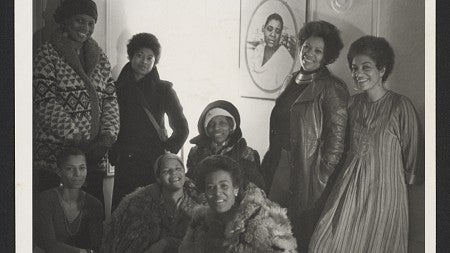
Overwhelmed and Undermined and OK with It
Research on Camus yields a philosophy for overcoming addiction
By Rosemary Camozzi
5 min read
When we casually say something is “absurd,” we don’t give the word much thought. “She tried to climb Mount Everest in flip-flops? That’s absurd!” we might say.
We use the word to describe something ridiculous, but it originally meant “out of tune” or “discordant.” This perfectly describes what it means to be human, according to French philosopher Albert Camus. We expect a grand meaning to life, and when we discover—or unknowingly feel—that there isn’t, we find ourselves out of tune with an irrational universe. In his essay The Myth of Sisyphus, Camus called this state—which often encompasses anxiety and boredom—“the absurd.”
It may seem like a bleak perspective, but discovering the concept led to a life-changing awakening for one philosophy student at the University of Oregon. “When I first read Camus, I went home and cried,” says Shane Cooney, BA ’19 (philosophy), BA ’20 (political science). “Camus gave me a beautiful articulation of the way I found myself in the world, and everything came together in a profound and intense way.”
STRAIGHT A’s, BOREDOM, AND DRUGS
A member of the Confederated Tribes of Grand Ronde, Cooney grew up in Bend. He was a straight-A student, but found school boring. Boredom led to smoking pot at 14, alcohol at 15, and then prescription drugs.
He left school during sophomore year to pursue a tuition-free associate degree from the community college where his dad, a veterinarian, taught. “Then my drug use took off, and I threw a perfect opportunity in the trash,” he says. He went back to high school for junior year to play varsity soccer, but left as soon as the season was over. He tried once more as a senior, but left again—this time for inpatient rehab.
Sobriety lasted for a while. Cooney earned his GED and went to Lane Community College to study business. But again, school was boring, and again, he considered dropping out. It was a philosophy course taught by Caroline Lundquist, who now teaches at the Clark Honors College, that sparked a turnaround. “Philosophy speaks to everything that I’m about,” he says. “It was the first time I really found my place.”
Cooney transferred to the UO after earning his associate degree in June 2017, but began using drugs again during the summer before classes began. “Unfortunately, you can’t get away from the human situation,” he says. “There are always things that come back to haunt us or that throw us off balance.”
THERAPY WITH KANT, CAMUS, AND FRANKL
He started school anyway, and after a stint in rehab, finished the term with straight A’s. He went on to earn two undergraduate degrees over the next three years. “I’m so glad I stayed,” he says. “If I had left behind philosophy, I would probably still be using today.”
Cooney wrote his philosophy honors thesis, “Overwhelmed and Undermined: The Use of Psychoactive Substances and the Problem of Meaninglessness,” on how a lack of meaning in life can help explain addiction. “The thesis was a long, drawn-out therapy session between me and these other thinkers,” he says. “It involved a lot of self-reflection and thinking about the reason for my actions.”
In the paper, Cooney describes how he was first drawn to German philosopher Immanuel Kant’s “categorical imperative,” hoping he could stay off drugs if he adhered to a supreme principle of morality. “But I found that it doesn’t work,” he says. “Human life is way too nuanced to have one formulation that can encompass human or moral life in general.”
After a thorough reading of Camus, he writes, he realized that his drug use was an attempt to address a fundamental lack of meaning in life. “I began to see my story as one of the individual struggling with the absurd,” he says. “At times the recognition of the absurd can be felt very viscerally, but sometimes it is more of a constant humming that we feel or hear that we can’t put a finger on. Every person experiences it differently.”
Cooney goes on to discuss the limitations of Camus’ viewpoint, but he finds hope and inspiration in the work of Austrian psychiatrist and Holocaust survivor Viktor Frankl.
“Frankl still believed you can create meaning in the world, even when you’re given every reason to believe that there can be absolutely no meaning,” Cooney says. Years in therapy taught him that “pain is inevitable and suffering is a choice,” but he now has a different take. “Suffering is inevitable, and life depends on the attitude you take toward that,” he says. “Whether it’s watching a sunset on the beach, hugging a friend, or doing something creative, these all bring meaning to life.”
“JUST AT THE BEGINNING OF HIS STORY”
Cooney looks forward to sharing his research with others struggling with addiction. “Understanding the root cause is the only way you can go forward and take appropriate action,” he says. “Boredom and pain are inescapable, and once the high wears off, they are still there. To negate that part of yourself is especially dangerous.”
Senior instructor Steven Brence, who served as Cooney’s thesis coadvisor along with Lundquist, has encouraged him to expand the work into a book that could reach a wide audience. “Shane has a novel approach to the problem of substance abuse,” he says. “This project could reach far beyond scholarly discussion and give therapists another tool to work with.”
Brence sees in Cooney a true philosopher with a bright future. “It’s not just an avocation or pursuit for him—it’s a way of being,” Brence says. “He’s just at the beginning of his story.”
With plans for a PhD, Cooney is applying to graduate schools. Along with furthering his work on the philosophy of addiction, he hopes to bring attention to Native American philosophies, which, although taught at the UO, are largely absent from academia, he says. “We should let these voices speak for themselves as opposed to framing them in a Western construct,” he says.
He is also interested in helping tribal members dealing with addiction. “My grandma lived on the rez and has told me many stories of addiction,” he says. “I want to do what I can to help these communities.” In his thesis, Cooney quotes the penultimate line in The Myth of Sisyphus: “The struggle toward the heights is enough to fill a man’s heart.”
“If life was easy,” he adds, “I don’t know if it would be as meaningful as it is.”
Rosemary Camozzi, BA ’96 (journalism: magazine), is a magazine editor and writer in Eugene.




